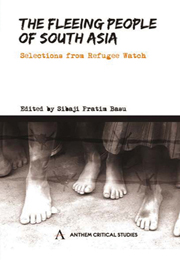Book contents
- Frontmatter
- Contents
- Acronyms and Abbreviations
- Foreword by Ranabir Samaddar
- Preface
- ETHICAL ISSUES
- LAWS
- SOUTH ASIA
- Introduction
- Refugees in South Asia: An Overview
- Internally Displaced Persons in Sri Lanka
- A Matter of Ethnicity
- Scrutinizing the Land Resettlement Scheme in Bhutan
- The Taliban Shelter Seekers or Refugee Warriors?
- Afghan Refugees head for Tajikistan, holed up in the Pamir Mountains
- Impact of International Jurisdiction on Afghan Refugee Rights
- Development Induced Displacement in Pakistan
- On the Trail of Burma's Internal Refugees
- Assault on Minorities in Bangladesh: An Analysis
- Neoliberal Globalization and Women's Experiences of Forced Migrations in Asia
- Who Went Where and How are They Doing? Pakistanis and Indians Outside South Asia
- INDIA
- GENDER
- INTERVIEW/CORRESPONDENCE
- REPRESENTATIONS
- Index
Development Induced Displacement in Pakistan
from SOUTH ASIA
Published online by Cambridge University Press: 05 March 2012
- Frontmatter
- Contents
- Acronyms and Abbreviations
- Foreword by Ranabir Samaddar
- Preface
- ETHICAL ISSUES
- LAWS
- SOUTH ASIA
- Introduction
- Refugees in South Asia: An Overview
- Internally Displaced Persons in Sri Lanka
- A Matter of Ethnicity
- Scrutinizing the Land Resettlement Scheme in Bhutan
- The Taliban Shelter Seekers or Refugee Warriors?
- Afghan Refugees head for Tajikistan, holed up in the Pamir Mountains
- Impact of International Jurisdiction on Afghan Refugee Rights
- Development Induced Displacement in Pakistan
- On the Trail of Burma's Internal Refugees
- Assault on Minorities in Bangladesh: An Analysis
- Neoliberal Globalization and Women's Experiences of Forced Migrations in Asia
- Who Went Where and How are They Doing? Pakistanis and Indians Outside South Asia
- INDIA
- GENDER
- INTERVIEW/CORRESPONDENCE
- REPRESENTATIONS
- Index
Summary
BACKGROUND
Following the independence in 1947, the economic development planning in Pakistan, was based on large-scale industrialization. In less than the period of the first five-year plan, various mega development projects were launched to exploit natural resources.
The projects for building large dams at Terbela and Mangla were initiated in the early decades of independence to rise among the industrialized countries of the world. In the later years, Ghazi Brotha and various other medium scale dams were also constructed to regulate water resources. Although these projects played an important role in the economic development of the country, at the same time they caused havoc in terms of depletion of natural resources and particularly the displacement of thousands of people from their ancestral homes and habitats. People living on dam sites for centuries were not only physically displaced but they also lost their livelihood. Consequently, the displaced populations faced various kinds of impoverishment risks like landlessness, joblessness, homelessness, marginalization, food insecurity, loss of common resources, among others. […]
With regard to delayed resettlement, Tarbela Dam Project is the most relevant example where a significant number of families are yet to be resettled. The land given in compensation was not as good in terms of quality as was acquired by the government. Either resettlement was delayed or just could not be done. Cash compensation to the affected people was not adequate either. The dislocation of the landless has gone unnoticed in all water related projects.
- Type
- Chapter
- Information
- The Fleeing People of South AsiaSelections from Refugee Watch, pp. 183 - 186Publisher: Anthem PressPrint publication year: 2009



